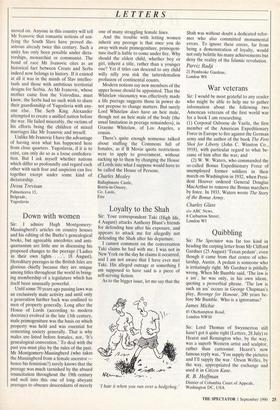Down with women
Sir: I admire Hugh Montgomery- Massingberd's articles on country houses and his editing of the Burke's genealogical books, but agreeable anecdotes and anti- quarianism are little use in discussing his proposed changes to the peerage ('Ladies in their own tights . . .', 18 August). Hereditary peerages in the British Isles are glorious chiefly because they are unique among titles throughout the world in bring- ing membership of a legislature which has itself been unusually powerful.
Until some 70 years ago passing laws was an exclusively male activity and until only a generation further back was confined to men of property generally. Long after the House of Lords (according to modern doctrine) evolved in the late 13th century, male primogeniture was the basis on which property was held and was essential for cementing society generally. That is why males are listed before females, not, 'It's genealogical convention.' To deal with the past you must play by the rules of the past. Mr Montgomery-Massingberd (who takes the Massingberd from a female ancestor hence his feminism?) surely knows that the peerage was much tarnished by the absurd resuscitation throughout the 19th century and well into this one of long abeyant peerages to obscure descendanti of merely one of many straggling female lines.
And the trouble with letting women inherit any peerage is that once you do away with male primogeniture, primogeni- ture itself is liable to come under fire. Why should the eldest child, whether boy or girl, inherit a title, rather than a younger one? Yet if titles can descend to any child willy nilly you risk the tatterdemalion profusion of continental counts.
Modern notions say new members of the upper house should be appointed. That the Whitelaw viscountcy was effectively made a life peerage suggests those in power do not propose to change matters. But surely Lord Whitelaw does have an heir male, though not an heir male of the body (the usual limitation in peerage remainders), in Graeme Whitelaw, of Los Angeles, a cousin.
There's quite enough nonsense talked about stuffing the Commons full of females, as if B Movie quota restrictions were to apply to government, without sucking up to them by changing the House of Lords into what I suppose would have to be called the House of Persons.
Charles Mosley
Ballaghmore Castle, Borris-in-Ossory, Co. Laois, Eire


















































 Previous page
Previous page